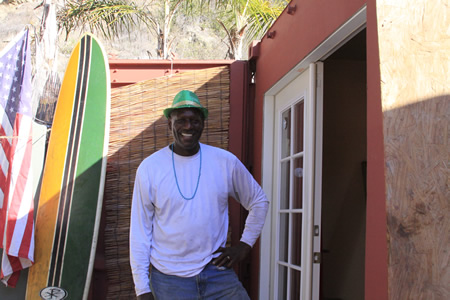
One of Laguna Beach’s rare private refuges for local homeless people to find a permanent place to live was recently ordered closed by city officials, displacing five people back to the street and confounding homeless advocates.
The five residents living at the row of rooms in a mobile trailer in Laguna Canyon once used as a construction-site office had to leave, according to city code inspectors, because the area was not zoned for residential use. Among them was Cliff Mabra, a longtime local street musician who had to vacate the room he was living in for three years at Palmer Masonry and died last December.
Business operator Sam Palmer had been renting rooms near a cluster of commercial businesses to disadvantaged people for about six years. He believes a former tenant filed a complaint with the city’s code enforcement department, which informed Palmer he was in violation of commercial zoning regulations that prohibit residential use.
Palmer rented out five 100-square-foot rooms, subdividing the former construction office trailer. It included a communal kitchen, bathroom and laundry room. Code inspector Fred Fix said the rooms were closed last October.
Land owner Franz Visoul of Idaho agreed with Palmer not to fight City Hall and to close the rooms. The most obvious code violation, Fix said, was a portable metal cargo bin, a sixth room that had been converted to a housing unit with a window, French doors, insulation to protect against the sun’s heat and electricity.
“When the fire department came through,” said Palmer, “they said, ‘Absolutely nobody living in the bins’.”
The loss disappointed Jim Keegan, a local homeless advocate, who offered Palmer legal assistance if he wanted to keep the rooms open. Palmer declined.
“The city makes things more difficult for themselves,” said Keegan, who initiated a lawsuit by the American Civil Liberties Union against the city in 2009 that alleged the city’s ban on overnight sleeping on public land was unconstitutional. The resulting settlement led the city to provide an alternative; hence the establishment of the Alternative Sleeping Location on Laguna Canyon Road. “Some people have been able to get a van or something to sleep in at night instead of being on the beach but the police harass them anyway,” said Keegan. “It’s kind of self-defeating.”
Palmer said he’d still like to do something for people who need low-cost housing but is ready to move onto establishing an equipment rental co-op for struggling building contractors.
“It takes money to provide housing for the homeless and sentiment for the people who live around them because hygiene and mental capacities are a little bit compromised,” Palmer said. “We tried to work with them mentally and with drugs and alcohol counseling, and it was insane. The homeless were too afraid to go to the meetings because they felt they’d be somewhat trapped.”
Palmer said he brought out a dietician to teach his tenants about quality food and their health. “It just didn’t work out for us,” he said. “We kept on trying. We did about four meetings and then everybody started disappearing when the meetings were going to happen so it was hard.”
Kim Panno lived at Palmer Masonry for two years. She was living on the streets before that. With a monthly social security stipend, she said it was easy to move in because there was no first-and-last-month’s rent or security deposit. She started cleaning houses part-time and now works at a thrift store and lives in an apartment in Dana Point.
The rooms “helped a lot of people get out of the gutter,” said Palmer.





As one of those displaced people, I am still living in my car. Without a job (I was laid off just before eviction) my chances of finding housing are ZERO. Finding work without a space to live in is near to impossible. Housing codes are fine, but cities will have to eventually make SOME kind of adjustment unless letting people die on the street is part of a society they can support.
Building codes are a good thing. However, since the spaces had been safely rented for more than a decade without harm, who benefits form such strict adherence to the letter of the law? What benefits are worth a human life?
In America today there are three empty, foreclosed structures for every homeless person on the street today. It is our choice to fund war after war and neglect our citizens, many of whom are homeless through economic hardship rather than mental health issues. Thank former Pres. Ron Regan for eliminating State care for such individuals…
Low cost housing situations are even harder to find now that everyone’s property is underwater and/or bank owned, and future population displacement due to poverty and climate disasters will only continue to rise for the next century. So at some point, the sort of spaces offered by Sam Palmer will become a new normal. Economically, it’s inevitable.
Too bad this was not in time to save poor Cliff.
thank you for adding your perspective to the conversation.